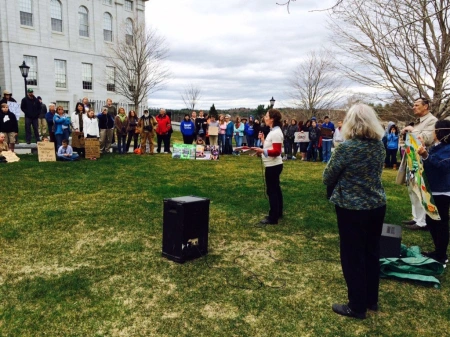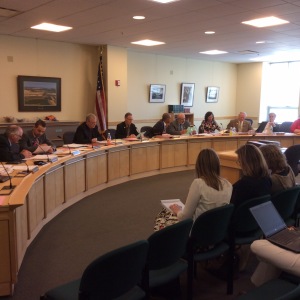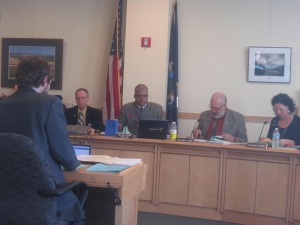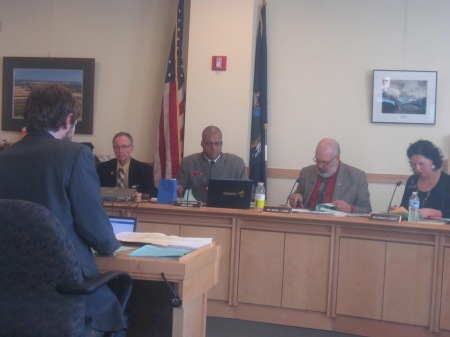 Do we have the freedom of choice about how and where we acquire food for our own nourishment, sustenance, bodily health and well-being?
Do we have the freedom of choice about how and where we acquire food for our own nourishment, sustenance, bodily health and well-being?
Of course we do. These rights are as natural, inherent, and unalienable as the rights to life, liberty and the pursuit of happiness. Ultimately, each of us deserves the freedom to work out our own nutrition and food regimen. You might be surprised to find out, however, that these rights are not protected by the constitution, nor are they recognized by U.S. courts, nor by the Food and Drug Administration (FDA).
“Food is Life. Do we have a right to obtain the food we wish, or don’t we? It’s really that simple. Let’s put it in black and white. Let’s put it in writing.”
—Rep. Craig Hickman, Bill Sponsor of LD 783
With your help, Maine could become the first state in the nation to provide constitutional protection for our right to obtain the food we wish to eat, to grow and produce food for our own sustenance, and the right to save and exchange seed.
TAKE ACTION: Please tell Maine lawmakers to let the people decide on our right to choose where and how we acquire food for our own nourishment, sustenance, bodily health and well-being. Tell Maine lawmakers to let LD 783, RESOLUTION, Proposing an Amendment to Constitution of Maine to Establish a Right to Food Freedom and Food Self-Sufficiency go to the ballot box for ratification in November.
Why do we need to amend the Constitution of Maine to include food rights in our state’s Declaration of Rights?
In a 2010 District Court case, the FDA explicitly stated that we do not possess these natural, inherent, and unalienable rights.
“There is no absolute right to consume or feed children any particular food.”
“There is no ‘deeply rooted’ historical tradition of unfettered access to foods of all kinds.”
“[The] assertion of a fundamental right to their own bodily and physical health…is unavailing because [consumers] do not have a fundamental right to obtain any food they wish.”
Food lawyer Peter Hutt states, “The constitutional authority of the government to determine the food that can lawfully be marketed, and the constitutional right of the individual to personal freedom and control over his own destiny, will at some juncture inevitably conflict.”
That day of conflict has arrived and we have the opportunity to make this moment of conflict transformational with the proposed constitutional amendment:
Section 25. Right to food freedom and food self-sufficiency. All individuals have a natural, inherent and unalienable right to acquire, produce, process, prepare, preserve and consume the food of their own choosing, for their own nourishment and sustenance, by hunting, gathering, foraging, farming, fishing, gardening and saving and exchanging seeds, as long as no individual commits trespassing, theft, poaching or other abuses of private property rights, public lands or natural resources in the acquisition of food. Furthermore, all individuals have a right to barter, trade and purchase food from the sources of their own choosing for their own bodily health and well-being. Every individual is fully responsible for the exercise of these rights, which may not be infringed.
TAKE ACTION NOW: LD 783 needs a 2/3 vote in both the House of Representatives and the Senate in order to put the question on the ballot this November. Tell Maine lawmakers that you want them to send LD 783 to the voters and let the People decide.
A brief history of LD 783 and current updates: In the First Regular Session of the Maine Legislature last spring, Rep. Craig Hickman, a farmer in Winthrop, introduced LD 783 to add the right to food to Maine’s Declaration of Rights. Hundreds of Maine citizens showed up on the day of the public hearing and dozens offered testimony in favor of LD 783. The bill was carried over to the Second Regular Session to address concerns raised by some legislators and citizens that this bill could somehow be misconstrued to grant greater governmental authority over providing food to people, rather than securing and protecting individual rights. Or that it would promote trespassing, stealing, poaching and other abuses of private property rights. Even though no one interprets the right to keep and bear arms to mean the state must provide all people with firearms or that people have a right to steal firearms, all concerns were taken seriously and considered. In other words, the bill needed some time to ferment. In the period between sessions, Rep. Hickman sought input from Republicans and Democrats, Independents and Libertarians, conservatives and progressives, allies and foes, farmers and fishermen, chefs, cottage food producers, homesteaders and lawyers until the language was right. Like a big community pig roast barbecue, the amended version is the collaborative effort of many.
Here’s what happened at the work session on February 4, 2016: Rep. Hickman struck his first proposal for the constitutional amendment and replaced it with an amendment that better reflects the voices of the People. LD 783 was amended into a proposal to establish a constitutional right to food freedom and food self-sufficiency, explicitly prohibiting theft, trespassing, poaching, or other abuses of private property rights, public lands or natural resources in the acquisition of food. Now, representing the input of both allies and opponents, LD 783 won committee support in a bipartisan majority Ought to Pass as Amended Report, 8 voting in favor of the motion, and 5 against. Voting with Rep. Hickman in favor of the majority report were Sen. James Dill of Old Town, Sen. Thomas Saviello of Wilton, Rep. Ralph Chapman of Brooksville, Rep. Michelle Dunphy of Old Town, Rep. Donald Marean of Hollis, Rep. Jeffrey McCabe of Skowhegan, and Rep. Robert Saucier of Presque Isle. We thank them for their votes.
Testimony Against. Although LD 783 does not amend or invalidate any food safety laws or regulations currently on the books, the Director of the Bureau of Agriculture, Food and Rural Resources in the Department of Agriculture, Conservation and Forestry (DACF) testified against the bill at the public hearing last session, arguing that it would interfere with commercial farming but provided no evidence to support the claim. The representative from the Maine Farm Bureau testified against the bill suggesting that people who are harmed by hunger and poor nutrition need to depend more on food banks, not food self-sufficiency. This testimony plays right into the hands of the disempowering forces of programs rather than self-help, responsible liberty. More food choice, more food producers, and more community-embedded food options increase food production, food access and availability, food price competition, and ultimately benefits everyone, including the hungry. To assume that the most efficacious way to help the hungry is with more food banks promotes dependency and top-down policies.
On the day of the committee vote, DACF representatives urged committee members to oppose the measure making the claim that the department wouldn’t be able to enforce food safety regulations. Only a court could decide that, not the department, and only if an individual or group of individuals challenged a regulation in court. A cadre of lobbyists from the Big Food industry lobbied committee members hard to oppose the measure, doubling down on their claim that it would hurt Maine’s reputation and make Maine-produced food less marketable outside the state. Declaring a fundamental right to food choice and to our health could make Maine food less marketable? That’s a fear-based claim that just doesn’t make sense. Sen. Edgecomb of Caribou, Rep. Russell Black of Wilton, Rep. Anthony Edgecomb of Fairfield, Rep. MaryAnne Kinney of Knox, and Rep. Carol McElwee of Caribou all voted against the bill. Please call on these lawmakers to do the will of the People who testified in favor of the bill by voting FOR the Right to Food Freedom and Food Self-Sufficiency. Tell them that we want the chance to vote on this constitutional amendment at the ballot box.
Here is how the question will read on the ballot:
“Do you favor amending the Constitution of Maine to declare that all individuals have a natural, inherent and unalienable right to acquire, produce, process, prepare, preserve and consume the food of their own choosing for their own nourishment and sustenance and to barter, trade and purchase food from the sources of their own choosing for their own bodily health and well-being?”
Tell your State Representatives and your Senators to let the People say YES.
Some of the voices who came to testify at last spring’s public hearing offer us good reasons to share with legislators on the importance and urgency of amending the Maine Constitution to add food freedom to our Declaration of Rights:
Rep. Craig Hickman of Winthrop, Maine, Sponsor of LD 783:
“Establishing a right to acquire the food of our choosing gives us, the People, legal ground to protect our own health, our property, our food and our lives. Just like the other rights declared in Article I of our Constitution, the right to food is a fundamental liberty right. It is a right increasingly infringed. If we protect it in our constitution, the strength of the law shifts, away from corporatist and government control of our food and our health and toward the People.
“There is nothing more intimate than eating. Who, other than you, should decide what you are allowed to eat for your own nourishment and sustenance?
“Let us stand on solid ground and establish legal protection for our health, for our happiness, for our liberty.”
Joel Salatin, Ecological Farming Guru at Polyface Farms in Virginia:
“The only reason the Founders of our Great Republic did not include food rights alongside the right to bear arms, to speak, and to worship was because no one at that time could have envisioned a day when citizens could not acquire the food of their choice from the source of their choice….
“I can’t imagine a more basic human right, a more bipartisan issue, than protecting my right to choose my body’s food. Who could possibly think that such freedom of choice should be denied? We allow people to smoke, shoot, preach, home educate, spray their yards with chemicals, buy lottery tickets, and read about the Kardashians: wouldn’t you think we could let people choose their own food?
“It comes down to autonomous personhood. If I don’t have the freedom to feed my three-trillion-member internal community of microbes in the manner I choose, then the infringement of other rights, such as freedom of the press and freedom of religion, can’t be far behind.”
(Mr. Salatin flew north to offer testimony on this important opportunity to protect our food rights)
Hendrik Gideonse, Brooklin, Maine, on why we need this protection now:
“Adding an enabling right to acquire, barter, trade and purchase foods of our choosing for our own sustenance and health to the existing right to life and liberty would cloak our individual food choices in fundamental law. It would safeguard us against the actions of misguided corporations and government agencies seeking to keep us ill-informed about what we’re eating or against absurd claims, such as the Food and Drug Administration made in 2010, that people have no ‘fundamental right to their own bodily and physical health… because [consumers] do not have a fundamental right to obtain any food they wish.”
Joy Metcalf, Northport, Maine, on why LD 783 is so important:
“What is more fundamental to life than food, and what is more fundamental than the liberty to choose what foods we want to nourish our bodies and our families?”
Heather Retberg, Penobscot, Maine, on why the time is ripe for LD 783:
“Our access to food, our right to life, our right to the founding of life, seed, is increasingly legally controlled by corporate food monopolies. And when they sue, the law is often on their side. People lose. We lose our access to food, to food integrity, to our own bodily and physical health.
“LD 783 gives the people legal standing in court. It gives us legal protection when there are aggressive lawsuits that inhibit our ability to access healthy food or to grow food of our choosing. The time has come when we need this articulated and protected under Maine’s constitution.”
David Berg, Esq.:
“Food choice is not a new right; it is a right and a practice as old as civilization. It allows us to define our own concept of existence, of meaning, of the universe, and of the mystery of human life.”
Peter Hutt, food lawyer & David Berg, Esq.:
“Since we are free to choose or reject many other risks, it is difficult for the public to perceive why we should not also be free to choose, on an individual basis, the risks that we will accept in the food we eat. All forms of living entail some amount of risk. To the extent that eating is (…) risky, it should be for the consumer to determine how much governmental protection and how much risk she wants.”
Betsy Garrold, Knox, Maine, on the importance of the right to food:
“The right to procure healthy and nutritious food, by which life may be preserved and enjoyed, and to manufacture it, is among these inalienable rights, which…..no state can give, and no state can take away; it is involved in the right to pursue one’s happiness.”
ACT NOW to protect food freedom, food self-sufficiency, and our own health. Tell your State Representatives and Senators to let the People say YES on LD 783.
Thank you for taking action.




 Posted by savingseeds
Posted by savingseeds 










